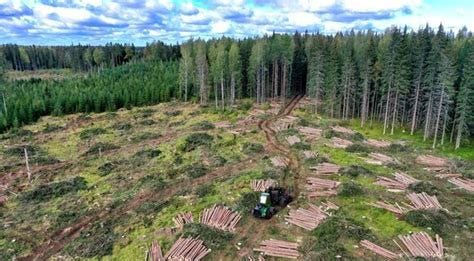Trump, House of Representatives Bringing Big Changes to U.S. Forest Service.
While Trump has frozen Forest Service funding and fired wildland firefighters, the House passed legislation to fast-track timber harvests under the guise of dealing with increased wildfire threats.
President Donald Trump has once again made headlines by advocating his preferred approach to forest management: sweeping and cleaning forest floors as a way to reduce wildfires. As fires raged across the Los Angeles metropolitan area, Trump doubled down on these practices upon re-entering the White House.
However, his own administration’s actions are making it more difficult to implement the forest management strategies he promotes.
Massive Cuts to USFS Workforce
Last week, the Trump administration reportedly fired 3,400 federal employees from the U.S. Forest Service (USFS), including a significant number of wildland firefighters. Similar to his approach at other federal agencies, these firings primarily targeted employees still in their “probationary period,” who lack the union protections afforded to long-time staff.
At the same time, the administration is starving USFS of the funds needed to carry out forest management efforts that could reduce wildfire risks. Trump has frozen funding from the Bipartisan Infrastructure Law and the Inflation Reduction Act—both key sources of billions of dollars for forest restoration on public and private lands.
A recent ProPublica investigation, "How Trump’s Federal Funding and Hiring Freezes Are Leaving America Vulnerable to Catastrophic Wildfire," describes the consequences of these decisions:
“The administration has frozen funds, including money appropriated by Congress, and issued a deluge of orders eliminating federal employees, which has thrown agencies tasked with battling blazes into disarray… The uncertainty has limited training and postponed work to reduce flammable vegetation in areas vulnerable to wildfire. It has also left some firefighters with little choice but to leave the force, their colleagues said.”
Rollback of Biden-Era Forest Protections
On his first day back in office, Trump revoked a Biden administration Executive Order on Strengthening the Nation’s Forests, Communities, and Local Economies. This move is expected to clear the way for increased timber harvesting in mature forests that had been under consideration for old-growth protections.
(NOTE—For additional reading, my analysis of the Biden Executive Orders on forests for Daily Yonder are available HERE and HERE).
“Fix Our Forests Act” Gains Momentum in Congress
Meanwhile, Congressional Republicans are advancing their own vision for wildfire and forest management. The House recently passed the Fix Our Forests Act (HR 471), which shifts forest management toward a more centralized model while also expanding timber harvesting, streamlining permitting, and introducing exemptions from the National Environmental Policy Act (NEPA) and Endangered Species Act (ESA).
Supporters of the bill argue it will:
Expedite environmental reviews for forest management projects
Reduce litigation that slows essential wildfire prevention work
Improve safety around powerlines and other infrastructure
Provide more support for wildland firefighters and their families
The legislation passed the House on January 23, 2025, with 215 Republicans and 64 Democrats voting in favor, while 141 Democrats opposed it. The bill now heads to the Senate, where its fate is uncertain. Conservation groups warn that some moderate Democrats may be the deciding votes, including Senators John Hickenlooper (CO), Michael Bennet (CO), Ruben Gallego (AZ), Mark Kelly (AZ), Alex Padilla (CA), Adam Schiff (CA), Angus King (ME), Elissa Slotkin (MI), Gary Peters (MI), and John Fetterman (PA).
With workforce cuts, funding freezes, and a shifting legislative landscape, the future of U.S. forest management remains deeply uncertain.
The core controversy over USFS forest management is about what is defined by public lands managers as “active forest management.” Most forestry and conservation-oriented USFS staff and contractors agree that active forest management is required to reduce wildfire risk in public and private forests. Techniques including thinning thick stands of small-diameter trees, removing brush, de-limbing and pruning branches, and using prescribed fire to periodically burn the thicket of flammable material on the forest floor are consensus solutions. These practices, and the staff to implement them, are what the Biden Administration’s USFS policies prioritized and funded.
The Trump Administrations/current Congressional approach that would expand clear-cutting on vast tracts of woods in the name of “preventing wildfires,” on the other hand, is much more controversial. Conservationists, environmentalists, and forest defenders across the country will likely aggressively oppose clear-cuts throughout Trump’s term.
The Cocklebur covers rural policy and politics from a progressive point-of-view. Our work focuses on a tangled rural political reality of dishonest debate, economic and racial disparities, corporate power over our democracy, and disinformation peddled by conservative media outlets. We aim to use facts, data, and science to inform our point-of-view. We wear our complicated love/WTF relationship with rural America on our sleeve.



